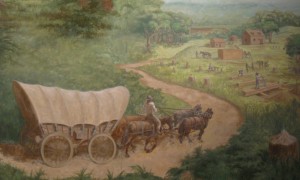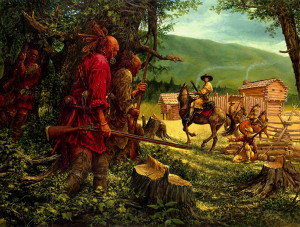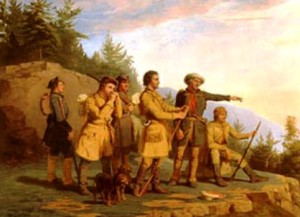Before I move on to the next battle in South Carolina, we need to discuss the Overmountain Men. These men were central characters in the Battle of Kings Mountain but some background is needed so you can understand who they were.
I have already discussed the difference between the regular army and the militia – whether the fighters were Loyalists or Patriots. The Overmountain Men were a third category of fighter that were only on the Patriot side.
Way back in the early 1600’s, the King of England needed people to settle in the wilds of Ireland. He called for volunteers and got groups of Scottish men who were willing to relocate to Ireland in exchange for land. These Scots settled in the Ulster area, raised sheep, and became master weavers. For over 100 years they and their descendants lived in Ireland as the Scots-Irish. But, early in the 1700’s, they became too good at weaving. The Englishmen who were also weavers protested that these Scots-Irish were putting them out of business. So Parliament put a tax on the wool imported from Ireland that wasn’t on wool made in England. This effectively put the Scots-Irish out of business, so they immigrated to a new land where they could live in freedom: the British colonies in North America.
 The Presbyterian Scots-Irish came to Philadelphia, intending to settle in Pennsylvania with its guarantee of religious freedom. But Pennsylvania was already very settled and the only land that was for sale was more expensive than they could afford. So they headed south in Conestoga wagons. They settled in the western areas of Virginia, North Carolina, and South Carolina starting in 1725. Over time they continued to move westward until they were settled in the Appalachian Mountains and even west of them.
The Presbyterian Scots-Irish came to Philadelphia, intending to settle in Pennsylvania with its guarantee of religious freedom. But Pennsylvania was already very settled and the only land that was for sale was more expensive than they could afford. So they headed south in Conestoga wagons. They settled in the western areas of Virginia, North Carolina, and South Carolina starting in 1725. Over time they continued to move westward until they were settled in the Appalachian Mountains and even west of them.
 The Cherokees who already lived in this land objected. The Cherokees were the civilized tribe, who had adopted English ways and been promised they could stay on their land in the mountains. So they attacked these Scots-Irish settlers frequently. In 1754 this, in part, led to the French and Indian War, where the French armed the Indians and incited them to attack the white settlers. The settlers soon got good at fighting “Indian style”: a fierce and bloody form of battle with no rules which we, today, call guerrilla style. In 1763 the French and British signed the Treaty of Paris. The French gave up their lands in Canada and the Indians gave up their lands east of the Appalachian Mountains. The British agreed that white settlers would not move into the territory west of the Continental divide of the Appalachian Mountains. The Indians expected the settlers over this line to be removed.
The Cherokees who already lived in this land objected. The Cherokees were the civilized tribe, who had adopted English ways and been promised they could stay on their land in the mountains. So they attacked these Scots-Irish settlers frequently. In 1754 this, in part, led to the French and Indian War, where the French armed the Indians and incited them to attack the white settlers. The settlers soon got good at fighting “Indian style”: a fierce and bloody form of battle with no rules which we, today, call guerrilla style. In 1763 the French and British signed the Treaty of Paris. The French gave up their lands in Canada and the Indians gave up their lands east of the Appalachian Mountains. The British agreed that white settlers would not move into the territory west of the Continental divide of the Appalachian Mountains. The Indians expected the settlers over this line to be removed.
 This, however, did not happen. The Scots-Irish who settled west of the Continental Divide were not willing to give up their homes because of a treaty. They bought or leased their land from the Cherokee and tried to hold an uneasy peace. The British did not aid them in this peace or help them when the Cherokee attacked settlements. The settlers west of the Continental Divide defended their own land and lived pretty much independent of any form of government. They wanted, primarily, to be left alone. These backwoods frontiersmen would come to be called the Overmountain Men, because they lived over the mountains, on the west side of the Continental Divide.
This, however, did not happen. The Scots-Irish who settled west of the Continental Divide were not willing to give up their homes because of a treaty. They bought or leased their land from the Cherokee and tried to hold an uneasy peace. The British did not aid them in this peace or help them when the Cherokee attacked settlements. The settlers west of the Continental Divide defended their own land and lived pretty much independent of any form of government. They wanted, primarily, to be left alone. These backwoods frontiersmen would come to be called the Overmountain Men, because they lived over the mountains, on the west side of the Continental Divide.
Why did the Overmountain Men abandon their neutrality and travel 300 miles to Kings Mountain to fight the Loyalists? I will answer that question in next week’s chapter of the Revolutionary War in a Nutshell.
